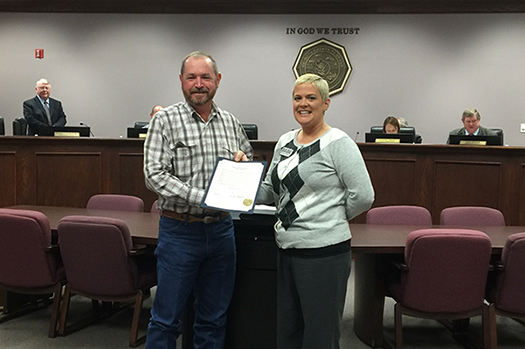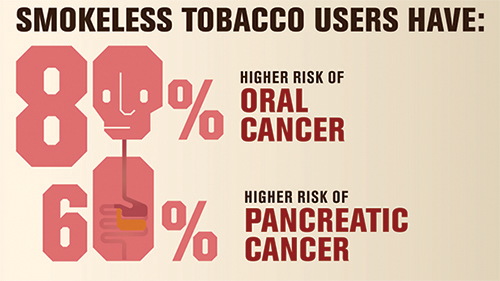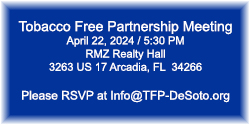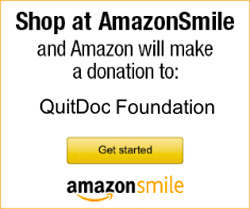News and Events
Smokeless Tobacco Use Remains High in DeSoto County
QuitDoc Foundation and Tobacco Free Florida are raising awareness during “Through with Chew Week”
February 9, 2016
Desoto County, Fla. – QuitDoc Foundation and the Florida Department of Health’s Bureau of Tobacco Free Florida are raising awareness about the dangers of smokeless tobacco, like chew and dip, during “Through With Chew Week.” This public awareness campaign was created to reduce the use of smokeless tobacco among young people and help combat this deadly addiction. “Through With Chew Week” takes place Feb. 14-20.
Although youth cigarette smoking rates in Florida are at an all-time low, 12.7 percent of high school students in Desoto County reported current use of smokeless tobacco products in 2014, according to the Florida Youth Tobacco Survey. This was significantly higher than the state average of 5.4%.
To raise awareness about the dangers of smokeless tobacco use QuitDoc Foundation, and the Tobacco Free Partnership of Desoto County presented to the Desoto County Board of County Commissioners to ask them to adopt a Through With Chew Week Proclamation. Partnership Member Courtney Moyett educated the Commissioners with local statistics about youth using smokeless tobacco within Desoto County. She also stated that bringing awareness to smokeless tobacco is imperative because products like chew and dip can contain more nicotine than traditional cigarettes, and can lead to a lifetime of addiction.
On Feb. 9th, 2016, at 9 a.m. the Desoto County Board of County Commissioners unanimously approved the proclamation. Mrs. Moyett thanked the Commissioners and County Administrator for their ongoing support of the tobacco control program in Desoto County and assured them that the partnership would continue to advocate against tobacco use.

Pictured from L-R:
Commissioner Elton Langford and Courtney Moyett Community Health Advocate for QuitDoc Foundation and the Tobacco Free Partnership of Desoto County
At least 28 cancer-causing chemicals have been identified in smokeless tobacco. Smokeless tobacco users have an 80 percent higher risk of oral cancer and a 60 percent higher risk of esophageal cancer and pancreatic cancer compared to non-users.
 |
Currently, there is no scientific or medical evidence that proves smokeless tobacco use is an effective method to help people quit smoking. Floridians who want to quit any form of tobacco have access to free and proven-effective resources.
- CALL: Call Tobacco Free Florida at 1-877-U-CAN-NOW to speak with a Quit Coach® who will help you assess your addiction and help you create a personalized quit plan.
- CLICK: Tobacco Free Florida’s online cessation tool can be accessed at tobaccofreeflorida.com/webcoach.
- COME IN: In person help is available with the help of Area Health Education Centers by calling 941-361-6602 or visiting http://www.gsahec.org/
For more information, please visit www.tobaccofreeflorida.com.
About Tobacco Free Florida
The department’s Tobacco Free Florida campaign is a statewide cessation and prevention campaign funded by Florida’s tobacco settlement fund. Tobacco users interested in quitting are encouraged to use one of the state’s three ways to quit. Since 2007, more than 126,140 Floridians have successfully quit, using one of these free services. To learn more about Tobacco Free Florida and the state’s free quit resources, visit www.tobaccofreeflorida.com or follow the campaign on Facebook at www.facebook.com/TobaccoFreeFlorida or on Twitter at www.twitter.com/tobaccofreefla.
The department works to protect, promote and improve the health of all people in Florida through integrated state, county and community efforts. Follow us on Twitter at @HealthyFla and on Facebook. For more information about the Florida Department of Health please visit www.floridahealth.gov.
References
- Florida Youth Tobacco Survey (FYTS), Florida Department of Health, Bureau of Epidemiology, 2014
- Lund I, Scheffels J. Smoking and Snus Use Onset: Exploring the Influence of Snus Debut Age on the Risk for Smoking Uptake With Cross-Sectional Survey Data. Nicotine and Tobacco Research 2014;16(6):815–9 [accessed 2014 Oct 31].
- U.S. Department of Health and Human Services. The Health Consequences of Smoking—50 Years of Progress: A Report of the Surgeon General. Atlanta: U.S. Department of Health and Human Services, Centers for Disease Control and Prevention, National Center for Chronic Disease Prevention and Health Promotion, Office on Smoking and Health, 2014 [accessed 2014 Oct 31].
- World Health Organization. IARC Monographs on the Evaluation of Carcinogenic Risks to Humans. Volume 89: Smokeless Tobacco and Some Tobacco-Specific N-Nitrosamines.[PDF–3.18 MB] Lyon (France): World Health Organization, International Agency for Research on Cancer, 2007 [accessed 2014 Oct 31].
- Tomar, SL. "Is Use of Smokeless Tobacco a Risk Factor for Cigarette Smoking? The U.S. Experience." US National Library of Medicine National Institutes of Health. U.S. National Library of Medicine, 5 Aug. 2003. Web. 19 Jan. 2016.
- World Health Organization. Smokeless Tobacco and Some Tobacco-Specific N-Nitrosamines International Agency for Research on Cancer Monographs on the Evaluation of Carcinogenic Risks to Humans Vol. 89. Lyon, (France): World Health Organization, International Agency for Research on Cancer, 2007 [accessed 2015 Feb 10].
- Boffetta, P, et al., “Smokeless tobacco and cancer,” The Lancet 9:667-675, 2008.


